Inside New York's Art World: An Interview with Hilary Harkness
David Galenson: In our earlier interview, you said that living in New York was very important to you. How long have you lived in New York, and have your reasons for living there changed over time?
Hilary Harkness: I moved to Manhattan from San Francisco in 1999 three years after getting an MFA from Yale School of Art. San Francisco had given me the headspace to paint without career-related distractions, but I was ready for a gallery and New York seemed to be the place. My first solo show was in 2001, and by 2003 I was with Mary Boone Gallery. New York City is a good match for me. My practice is solitary and time-intensive and I need to make the time spent out of the studio count. Living here makes seeing a wide variety of art and connecting with other artists easy, which is essential to me.
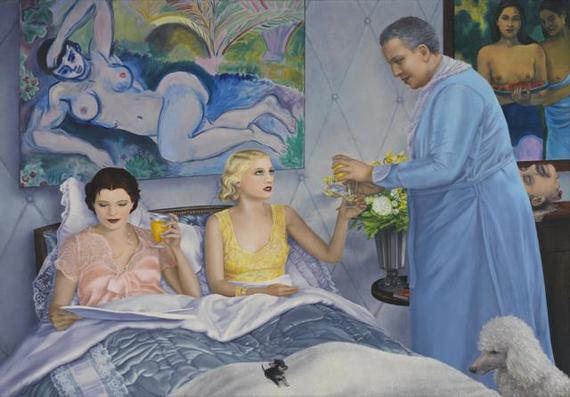 |
|
|
DG: For decades, artists and critics have complained that the cost of living in New York was becoming too high for it to continue as a real center for working artists. How do you and other artists you know feel about this?
HH: My experience of New York has never been inexpensive, but the cost of living here is outweighed heavily by the benefits - namely, access to the entire spectrum of the art world - this is a city that has a deep bench of talent represented in each area including artists, collectors, dealers, curators and critics. There may be less expensive places to live, but for now this proximity is priceless for me.
DG: What are your favorite museums in New York? Are there particular paintings that have influenced you, or that you simply like to go back and see?
HH: The Metropolitan Museum of Art is beginning to feel like a second home to me. My painting obsessions are continuing to evolve over time, but one constant for me is Ingres' portrait of the Princesse de Broglie in the Lehman collection. The expressive brushwork that went into creating her skirt sustains the illusion of fabric even at a very close viewing range. I get as close as I dare and let my brain toggle back and forth between the illusion of the skirt and the reality of the paint. It's mind-bending. I'd be curious to see a scan of my brain while I'm looking.
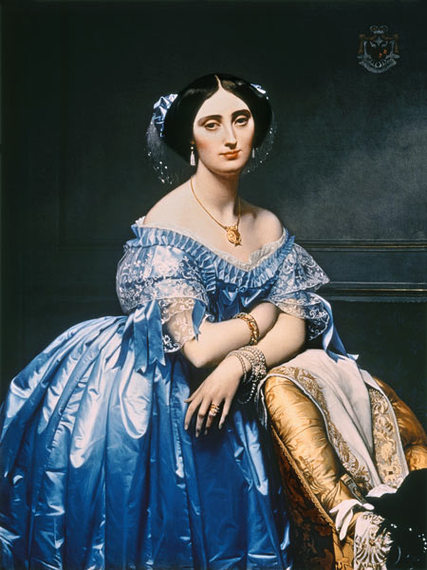 |
|
Image courtesy Wikimedia Commons. |
DG: What are the most memorable exhibitions you've seen in New York?
HH: Glitter and Doom at the Met - it introduced me to the paintings of Christian Schad, whose artworks show up in at least two of my paintings (Matterhorn and Pomeranian Line). The Steins Collect at the Met - I saw the Matisse's Blue Nude in person and have been able to draw on that experience in my recent paintings Blue Nude and Blue Nude With Blonde as well as when I co-curated Roy Lichtenstein: Nudes and Interiors at FLAG Art Foundation. Concordia, Concordia by Thomas Hirschhorn at Gladstone Gallery - The gallery was transformed into a wrecked cruise ship listing on its side. It was one of those magical moments for me as a viewer where the individual elements came into focus at different moments, but then at a certain moment the whole became clear. It's hard to describe how great that is to experience.
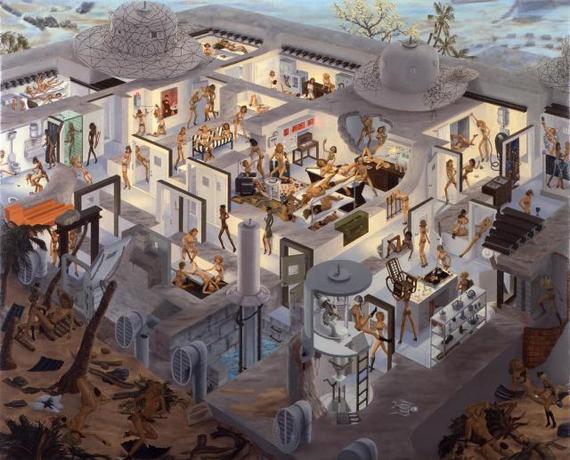 |
|
|
DG: Do you collect the work of other artists?
HH: I do. I have works by Nan Goldin, Kalup Linzy, Tracey Emin, Will Cotton, David Humphrey and a number of emerging artists.
DG: How do other cities you know, in the US or Europe, compare to New York as art centers? What cities do you most like to visit? Where would you live if you left New York?
HH: London is full of vitality and The National Gallery keeps me returning. I spend much more time in Paris though - I enjoy visiting the boulangeries before popping into the museums and shops. And there's nothing like capping off a busy day with some wine and cheese. If I left New York for a considerable amount of time, it would most likely be to travel rather than to settle down. A while back I spent a month traveling around southern India. If I had a second home it'd be in Wainiha on the north shore of Kauai. The dramatic scenery and moody, changeable weather make it a visually stimulating place and one where I've found inspiration for some of my paintings such as Flipwreck and one that is in progress now.
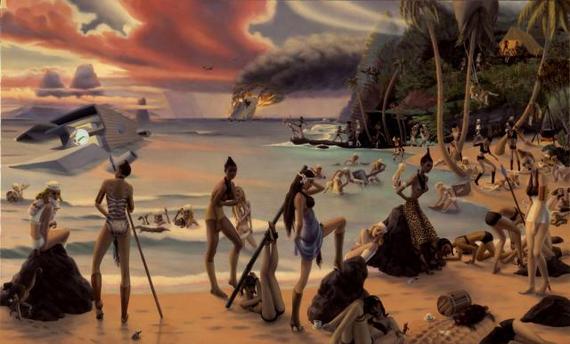 |
|
|
DG: How do you feel about the art world that's written about in the newspapers - the superstar artists and dealers, and the enormous prices? Do they affect other artists, or are they irrelevant to you?
HH: The art world is occupied by a huge range of artists - emerging and established - who are being captured by all forms of media, including social. Just as technology has given artists additional outlets for making and sharing work, it has provided writers with access to artists and artworks across the globe and expanded the dialogue. It can be overwhelming to keep track of it all, but it's also an exhilarating moment.
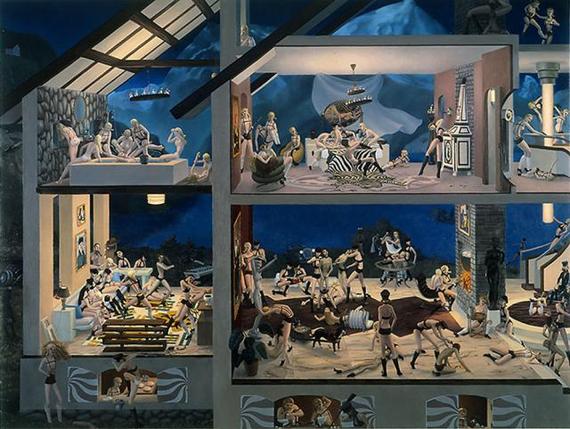 |
|
|
DG: What are some things you like in the New York art world that tourists don't know about - for example, museums or galleries that are not well known?
HH: FLAG Art Foundation in Chelsea is free to visit and usually has two shows going on at once. They show everyone from emerging artists to superstars. One thing that makes FLAG special is that they regularly select artists and other notable people to curate, which allows for exhibiting a wide range of art works. For instance, Shaquille O'Neal curated a show called Size DOES Matter in 2010. This past spring I co-curated Roy Lichtenstein: Nudes and Interiors with British artist Ewan Gibbs. In 2013, FLAG put on an exhibition of my cross-section paintings, bringing together a dozen years of my work. It is an intimate and welcoming environment, which is conducive to spending time with art.
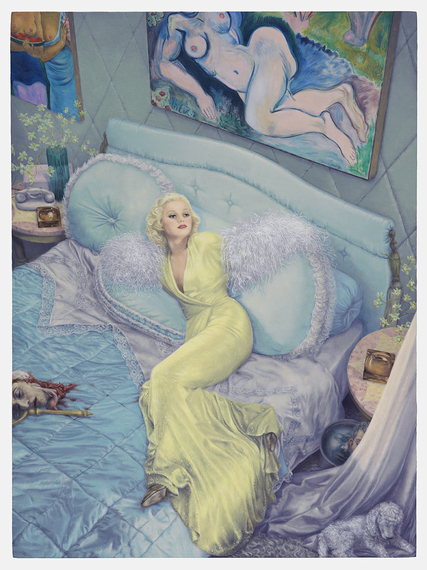 |
|
|
DG: Are there bars or restaurants where artists meet?
HH: In Chelsea I'll meet up with people at Sullivan Bakery for pizza and a glass of wine before or after visiting galleries. When I'm going to Lower East Side galleries I'll either begin with dim sum at Jing Fong on Elizabeth Street, or finish with at Pho Bang on Mott Street.
DG: How has the New York art world changed during the time you have been there?
HH: There are so many galleries it's hard to keep track of them all. Among artists there is a greater sense of possibility and joie de vivre, and as a result it feels livelier than it has at other points in my career.


















